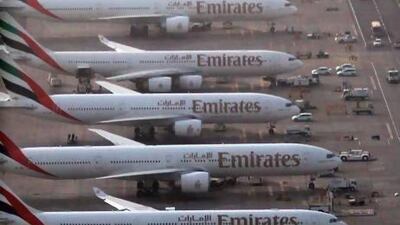Emirates Airline lifted profits by 52 per cent as the world's number one carrier by international traffic carried more than 39 million passengers across its fast-expanding route network.
The Emirates Group, which includes the airline, its dnata airport services unit and other companies, recorded a Dh3.1 billion net profit, up 34 per cent from last year, on revenue of Dh77.5bn, an increase of 17 per cent over last year's results.
"Throughout the 2012-13 financial year the group has collectively invested over Dh13.8bn in new aircraft, products, services and handling facilities," said Sheikh Ahmed bin Saeed Al Maktoum, the chairman and chief executive of Emirates Airline and Group.
"Every dirham that we earn is strategically placed back into our business and it is this tenacious approach that has allowed the group to maintain such strong and consistent profitability under challenging circumstances."
The airline experienced the largest increase in capacity in its history during the financial year, with 34 new aircraft added to the fleet, the highest in any single year, and the addition of 10 new routes. The airline has a further 198 aircraft on order worth more than US$71bn.
The airline carried an additional 5.4 million passengers over last year, an increase of 16 per cent and the highest increase in a financial year, resulting in it carrying a record 39.4 million passengers. Emirates also logged a passenger seat factor of 80 per cent, consistent with last year's results despite an increase in seat capacity of 18 per cent, the report said.
Emirates Airline's revenue reached a record high of Dh73.1bn, growing by 17 per cent compared with the 2011-12 financial year. Although the average price of jet fuel did not increase over last year, it remained high, said the report. The airline's fuel bill increased by 15 per cent over last year to Dh27.9bn, with total operating costs up 16 per cent. Even so, the airline division delivered a profit of Dh2.3bn, representing an increase of 52 per cent over last year's results.
"Staying the course, our strategy for growth has reaped high benefits this past financial year, which has been our strongest ever in relationship to capacity growth," said Sheikh Ahmed. "Emirates seat load factor over the last three years has been 80 per cent despite our increase in capacity by 44 per cent during the same period, showing the continued global demand for our product."
Over the year, the group's cash balance grew by 53 per cent, reaching Dh27bn. At the same time, the airline raised more than Dh28.6bn in new funding mainly to secure its ongoing fleet expansion, a record amount for the carrier.
It included $587.5 million financing for additional A380s with a bond that used the debt capital market in the United States. It also raised more than Dh20bn through finance and operating leases.
Defying the industry trend, Emirates SkyCargo reported revenue of Dh10.3bn, an 8 per cent increase over last year. Its tonnage increased 16 per cent to 2.1 million tonnes in a shrinking air freight market, contributing 15 per cent of Emirates' total transport revenue.
Emirates' Destination and Leisure Management, including hotels, generated revenue of Dh460m, an increase of 15 per cent over last year, supported by the opening of the JW Marriott Marquis Hotel in Dubai, the world's tallest hotel, at the end of last year.

